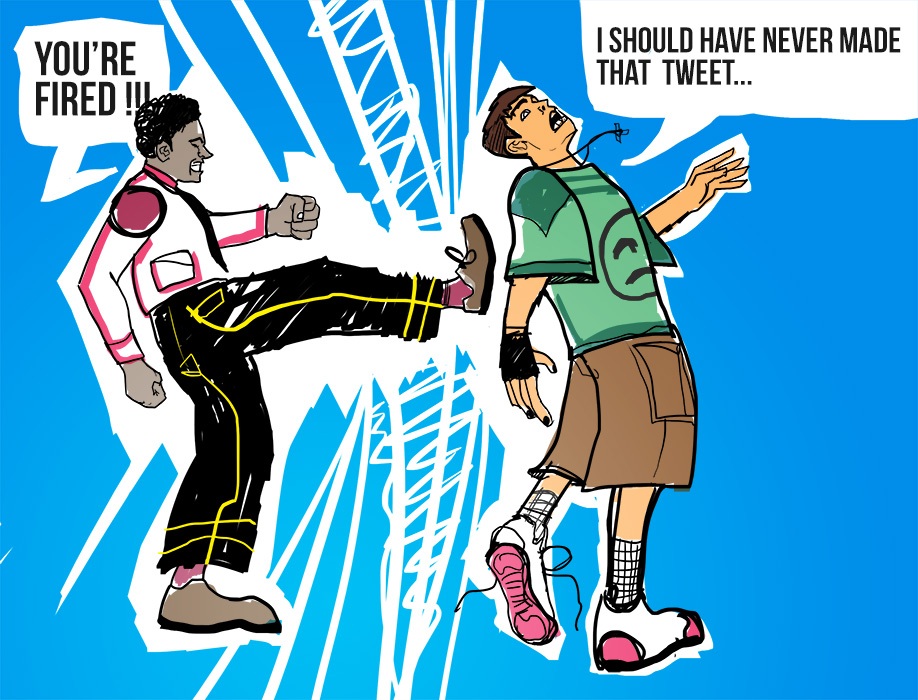
By Mars Dorian, {grow} Contributing Columnist
Remember the infamous Miranda police warning?
“Anything you say may be used against you.”
In today’s outrage culture, words (AKA tweets) can be used against you.
If you care about your online reputation, you should be worried.
It only takes one disgruntled person online to:
- Look up a potentially controversial tweet
- Confront your employer with the update, demanding your lay-off
This may sound far-fetched, but it happens more often than you think. Below, I want to show you how social media users were punished for sharing the ‘wrong’ stuff, and how it ruined their career.
I’m not happy about the changes, but you have to adapt to changes that you don’t like.
1) Censor yourself
Companies have guidelines for employees using the brand’s social media channels. This goal is to avoid updates that can damage the brand’s reputation, as it happened in the past. Whether it’s dropping F-bombs on the Chrysler Company’s official Twitter account or Home Depot sharing a racially tone-deaf image featuring a man in a gorilla costume next to two African-Americans.
Even if you’re a one (wo)man brand, you should behave as if a PR department is breathing down your sweaty neck.
You should always think before hitting the tweet button, asking yourself whether your update is controversial or (overly) offensive.
I see a lot of fellow authors, copywriters, and marketers sharing political rants on their social media channels, especially on Twitter and Facebook. They flame up ugly debates with followers, throwing curses at them and risk getting blocked. Why is this important?
Well, Twitter admitted that the reach of your tweets is determined by your interaction with others. So if you get muted and blocked by enough people, your future tweets will be seen by fewer followers. Shadowbanning.
Besides, are debates really worth it? I don’t know about you, but I’ve never changed my mind based on a heated and simplistic Twitter exchange.
Social platforms with limited character use are not nuanced enough for thoughtful discussions.
So don’t react to tweets, pause, think, and ACT deliberately. Yes, it takes more time, but we’re talking about your reputation.
2) You’re always representing
Even if you run your personal social media account, and you have a disclaimer stating ‘that your tweets are your own’, you can still risk getting fired from your company.
While you can separate yourself from your employer, your followers can’t. If they know you work for company X, they think of you as an extension of their brand, 24/7. This is especially true if you’re known in your niche.
Not too long ago, a narrative designer working for a popular game company was fired for arguing and (allegedly) insulting streamers on Twitter, even though she had used her private account.
The narrative designer probably thought she was just arguing with ‘annoying’ people on Twitter, but from the view of the game company, she was an employee causing brand damage.
So even if you put up disclaimers on your private account, you have to be cautious. Like it or not, but you’re always representing your current employer online.
Act accordingly.
3) Delete your past before it ruins you
In today’s outrage culture, some people are just looking to get you fired.
The best example would be James Gunn, famed director of Marvel’s Guardian of the Galaxy franchise. He’s an outspoken critic of the US president which rubbed off some people on Twitter. So they combed through Gunn’s earlier timeline, found controversial tweets about pedophilia and ordered Disney (which owns the Marvel brand) to fire Gunn.
And they did.
James Gunn defended himself stating that his tweets were almost a decade old, and that he had matured as a human being. It didn’t matter.
His past updates have ruined his career, at least with Disney.
Now you may not be as famous as James Gunn, but your tweets can still come back to haunt you.
Remember Justine Sacco? She was an unknown PR worker who released a racially tone-deaf tweet while traveling from NYC to South Africa. Not only did her update became viral; Justine was also fired from her job and harassed by thousands of people online. For a YEAR.
Don’t let this happen to you.
While it’s true that everything you put up on the Internet stays online forever, you still can delete controversial updates from the past. If only to mitigate future repercussions.
Using free services like TweetWipe or TweetDelete, you can mass-delete old tweets for your emotional and career well-being.
Conclusion: Your online reputation
Social media has enriched our lives with international connectivity, but it also has enabled a culture of mob outrage and revenge.
So here’s the slightly changed Miranda police warning: Anything you tweet may be used against you.
The tips above will help you navigate through the social media waves a little bit safer.
 Mars Dorian is an illustrating designer and storyteller. He crafts words and pictures that help clients stand out online and reach their customers. You can find his homebase at www.marsdorian.com and connect with him on Twitter @marsdorian.
Mars Dorian is an illustrating designer and storyteller. He crafts words and pictures that help clients stand out online and reach their customers. You can find his homebase at www.marsdorian.com and connect with him on Twitter @marsdorian.
Original illustration by the author.


